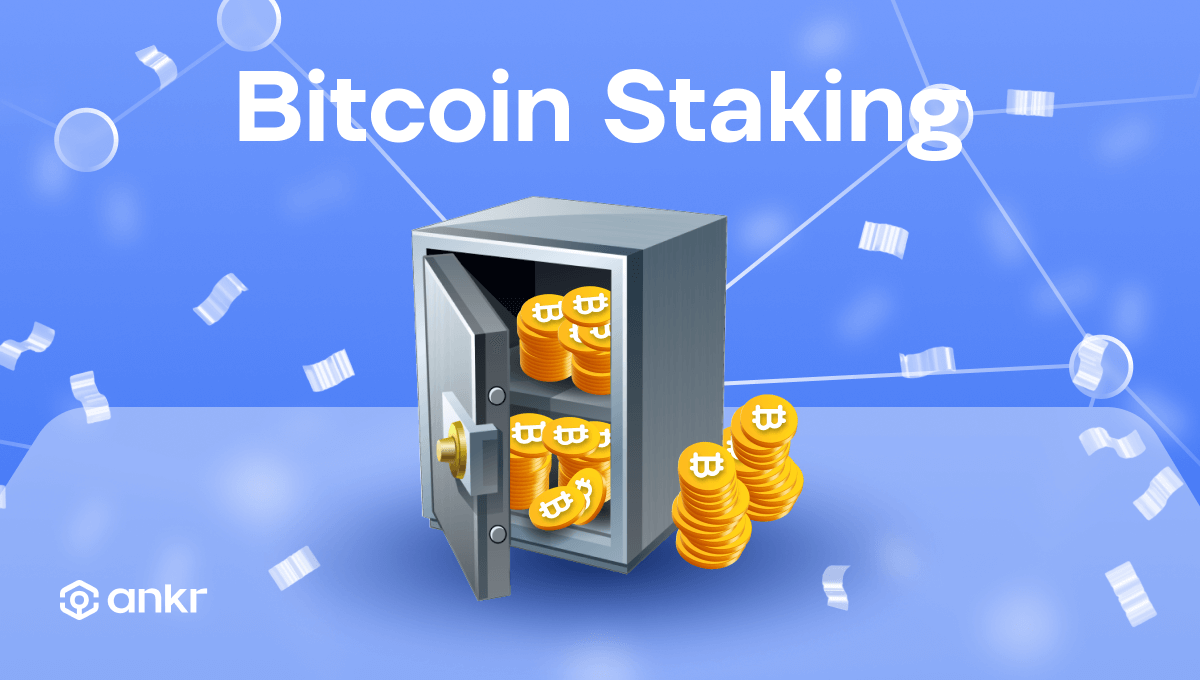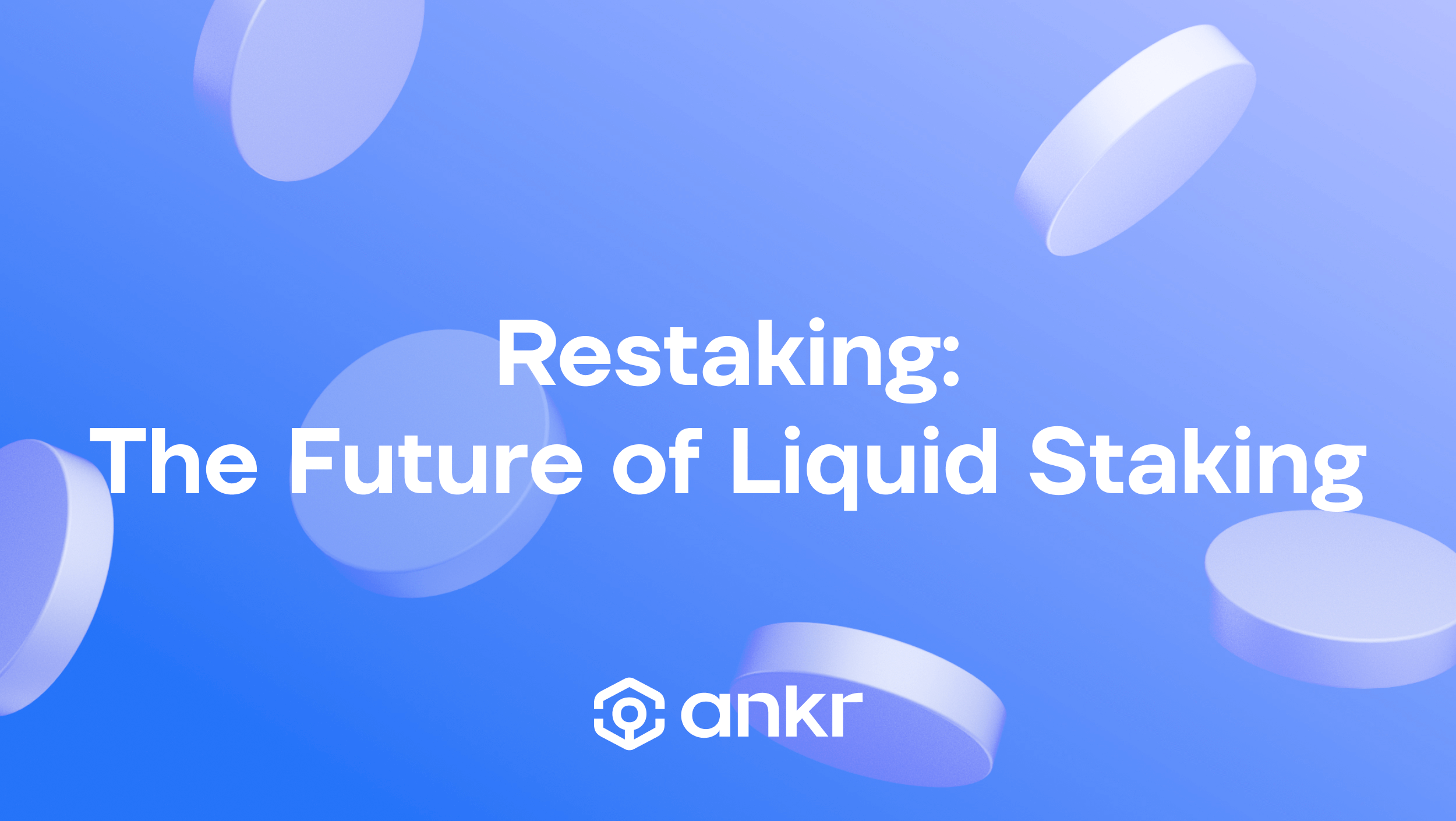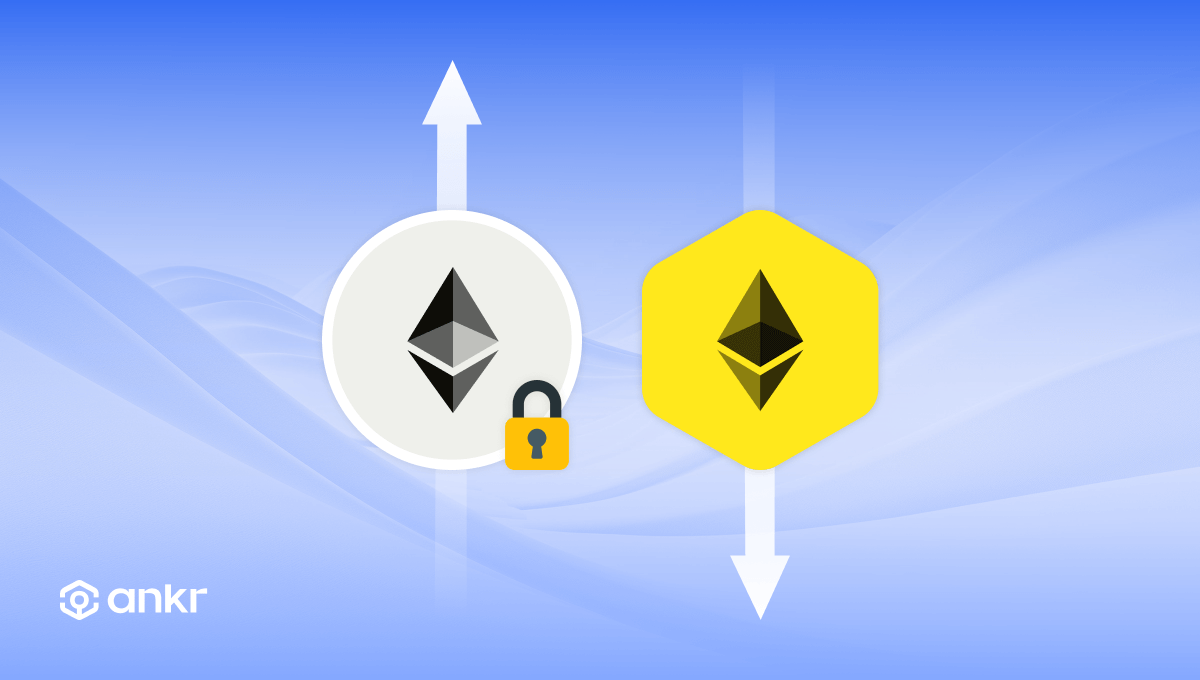Staking Bitcoin: What is, how it works, and rates [2024]

Ankr Staking Team
April 5, 2024
5 min read

Bitcoin staking represents a pivotal innovation in the DeFi space, enabling investors to earn rewards with their Bitcoin holdings.
Functioning on a Proof-of-Work (PoW) consensus model, the Bitcoin network was designed in such a way that rewards are mined. This means that, unlike Proof-of-Stake (PoS) blockchains like Ethereum, Bitcoin can’t be staked directly.
However, it is still possible to “stake” Bitcoin, by creating tokenized versions of BTC to be used in the DeFi ecosystem of Ethereum and other chains. This comprehensive guide delves into the mechanics of Bitcoin staking, providing a step-by-step walkthrough for engaging in the staking process.
What is Bitcoin Staking?
Ankr and the Babylon protocol have collaborated to create the first solution for staking Bitcoin. Staking Bitcoin is a process that allows Bitcoin holders to lock up their coins on the Bitcoin network before minting new tokens that represent the value of their BTC on the PoS blockchain of their choice. This provides a way to participate in Web3 network operations, akin to how one might stake tokens in various Proof of Stake (PoS) blockchains.
- BTC holders elect to stake their bitcoin via Ankr Staking.
- Their chosen amount of BTC is then locked on the Bitcoin blockchain where it is subject to the slashing conditions normally associated with staking.
- Stakers then choose which PoS networks they would like to stake to that are part of the Babylon protocol.
- Stakers then receive new Liquid Staking Tokens (LSTs) minted on their chosen PoS chain that represent the value of their BTC plus accrued staking rewards.
- Stakers can choose to unstake and unlock their BTC at any time while claiming their accumulated staking rewards.
Why investors should stake or consider staking Bitcoin
Bitcoin staking introduces a method to earn passive income on assets that would otherwise remain idle in wallets. This is especially appealing during a bull market, providing a more stable income stream alongside potential capital gains from price appreciation.
How Bitcoin Staking Works
Through collaborations such as Ankr and Babylon's, Bitcoin can be staked in a way that secures PoS networks. Babylon's protocol enables Bitcoin holders to lock their BTC, which then gets utilized in PoS systems, thereby boosting their security and economic robustness.
The process involves locking BTC on the Bitcoin chain while minting new tokens on PoS chains, creating a function that allows Bitcoin to participate in staking mechanisms indirectly. This is achieved through liquid staking tokens (LSTs) that represent the staked BTC on PoS networks.
Learn more about how Babylon works
Staking Bitcoin vs. Mining Bitcoin
Mining
Mining Bitcoin requires computational power to solve complex algorithms. In the old days, it was possible to mine using a personal computer. However, mining difficulty has gone up considerably since then.
Nowadays, Bitcoin mining is mostly done by companies instead of individuals. It can only be done profitably through specified equipment, called ASICs, and in places where energy prices are favorable.
Staking
Staking is a straightforward process. Users simply need to lock up their Bitcoin and they are already supporting the security and consensus of other networks.
Mining vs Staking
Setting up a Bitcoin mining operation is complex, expensive, and risky. Not only are ASICs expensive to buy, but they also require maintenance and efficient cooling methods.
These factors make Bitcoin staking a more simple and viable option, especially for retail investors. While there are still risks involved in Bitcoin staking, it is a much simpler process that doesn't require a large amount of capital.
Benefits of Staking Bitcoins
Here are the benefits of staking Bitcoin:
- Passive Income: Potential to earn rewards on holdings.
- Security Enhancement: Contributes to the security of multiple blockchain networks.
- Simplicity: Staking is an easy and quick process.
How to Calculate Bitcoin Staking Rewards
Calculations typically depend on the specific protocol's reward structure, the amount of BTC staked, and network conditions. Detailed formulas or calculators provided by staking platforms can offer precise estimates.
Factors Affecting Bitcoin Staking Rewards:
- Total amount staked
- Network conditions
- Inflation rates of the PoS tokens
- Protocol-specific reward mechanisms
Babylon Bitcoin Staking: An Overview
Babylon introduces a novel protocol for Bitcoin holders to stake directly on proof-of-stake (PoS) blockchains without third-party custody or wrapping, enhancing the security and economic resilience of PoS systems. This mechanism is a significant leap forward, merging Bitcoin's value with PoS networks efficiently and securely.
The collaboration between Babylon and Ankr is central to this initiative. Ankr's development of Liquid Staking Tokens (LSTs) for staked Bitcoin ensures its seamless integration across PoS chains, maintaining liquidity and security.
Key Features
- Trustless and Scalable: The protocol offers a decentralized environment for Bitcoin staking, ensuring staked assets are secure and recoverable as long as protocol guidelines are respected.
- Economic Security: Babylon's protocol provides economic security guarantees to PoS chains, allowing for efficient and secure unbonding of staked Bitcoin to maintain liquidity.
- Simplified Unbonding: The protocol enables quick and secure access to staked assets without the need for social consensus.
The joint venture between Babylon and Ankr marks a flexible and secure advancement in integrating Bitcoin with the PoS landscape, thus establishing a new benchmark in the DeFi landscape.
Frequently Asked Questions (FAQ) about Staking Bitcoin
Is it possible to stake Bitcoin?
Yes, through protocols like Babylon, facilitated by Ankr Staking.
How much can you make staking Bitcoin?
Returns vary based on network conditions and the amount of BTC staked.
Is it worth staking BTC?
It can be, for those looking for a simple way to earn rewards on their Bitcoin holdings.
Is Bitcoin staking profitable?
Profitability depends on market conditions, reward structures, and individual strategies.
Can I lose my Bitcoin if I stake it?
Staking through reputable platforms minimizes risks, but it's crucial to understand any platform-specific risks involved.
Where is the best place to stake BTC?
Platforms leveraging trusted protocols like Babylon and supported by experienced infrastructure providers like Ankr are preferred.
Rates to staking Bitcoin?
Rates depend on the specific staking protocol and market conditions.
Risks to staking Bitcoin?
Potential risks include smart contract vulnerabilities, market volatility, and protocol-specific risks.
Similar articles.

Liquid staking: The DeFi upgrade

Decentralized finance (DeFi) signaled the beginning of a new era in the history of crypto assets. Unlike conventional finance, it does away with the necessity...

Restaking: The Future of Liquid Staking

Diogo Costa
September 15, 2023
Liquid staking has been a raging utility in the blockchain sphere for quite some time now, and rightfully so. Users are flocking to liquid staking...
![Liquid Staking: A Comprehensive Guide [2024]](https://s3-frontend-strapi.s3.us-west-1.amazonaws.com/liquid_staking_cd9a2d0a03.png)
Liquid Staking: A Comprehensive Guide [2024]

Ankr Staking Team
March 20, 2024

What Is a Liquid Staking Token (LST)?
Ankr was the original pioneer behind liquid staking, an innovative financial mechanism that unlocks the value of staked...



